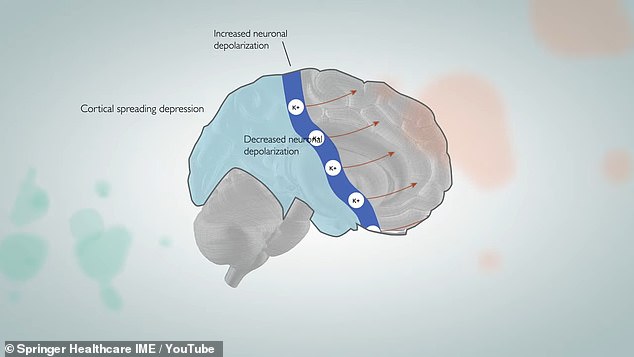Oxford scientists find the best migraine drug – and the prescription pill that’s no better than paracetamol
A large study has found that some new migraine drugs are no more effective than paracetamol in treating attacks.
A comprehensive analysis by researchers at the University of Oxford found that a cheaper class of drugs known as triptans are the most effective oral treatment.
They typically cost around a pound a pill and are better than the newer drugs, gepants, at controlling pain during attacks, which some 190,000 people experience every day.
According to experts, triptans are ‘underused’ and should be made more widely available to millions of patients.
The Migraine Trust says it is often a ‘painful trial and error’ to find what works for someone and they urge doctors not to discourage other medications.
An analysis found that all drugs were more effective at relieving migraine pain after two hours than placebo, and most drugs even relieved pain for up to 24 hours.
Scientists looked at 137 controlled trials involving nearly 90,000 patients who received one of 17 drugs or a placebo.
These drugs include triptans: eletriptan, rizatriptan, sumatriptan, and zolmitriptan. These drugs constrict blood vessels in the brain and reduce the release of pro-inflammatory chemicals.
A new series of drugs were also tested, including ubrogepant, atogepant and rimegepant (or ‘gepants’). These drugs bind to a protein released by the nerves at the onset of a migraine attack.
These can cost up to 12 times as much as triptans, estimated at around £12 per pill.
All were compared with paracetamol and anti-inflammatory painkillers for pain relief during an attack.
The analysis showed that all drugs were more effective at relieving migraine pain after two hours than placebo, and most drugs even relieved pain for up to 24 hours.

Migraine is estimated to affect almost 10 million adults in the UK, with women disproportionately affected.
Eletriptan is most effective for pain relief after two hours, followed by rizatriptan, sumatriptan and zolmitriptan.
According to the findings published in the BMJ, eletriptan and ibuprofen are most effective for pain relief for up to 24 hours.
Lead researcher Andrea Cipriani, professor of psychiatry at the University of Oxford, said: ‘We found that all the approved drugs are better than placebos, but some are better than other active drugs for the acute treatment of migraine, and that is new.
‘These drugs are four triptans; eletriptan, rizatriptan, sumatriptan and zolmitriptan. They are more effective than the other drugs and also better than the most recently marketed and more expensive drugs.’
He added: ‘The effectiveness of the new drugs is comparable to paracetamol. They are better than the sugar pill, but less than the four triptans.
“This is important information to consider because these new treatments are more expensive.”
Migraines are estimated to affect nearly 10 million adults in the UK. Women are disproportionately affected, with symptoms including severe headaches, visual disturbances, nausea and vomiting.

Before some people feel a migraine, their vision is disrupted. This happens when a wave of signals shoots through the brain, as in the diagram shown. These signals carry a fluid carrying proteins that cause migraines out of the brain and to pain receptors
Medicines regulator Nice recommends eletriptan and rizatriptan for the treatment of migraine, and sumatriptan and zolmitriptan for the treatment of migraine and cluster headaches.
Last year, rimegepant was also given the green light for up to 145,000 adults who had failed three previous treatments.
Robert Music, director of the Migraine Trust, said triptans “can be very effective for some” but many do not respond to them or cannot take them because of conditions such as heart disease.
He said: ‘Finding a migraine treatment that works can be incredibly difficult and can take many years of painful trial and error, with the consequences of this leading to job loss, financial hardship and significantly worse mental health.
‘We should not focus on undermining newer treatments, but rather on making them more accessible when people need them. That gives people more options and choices.’
Dr Eloisa Rubio-Beltran, a researcher at the Migraine Trust, said more research was needed to test the effectiveness of the drugs in real-world settings.
She said: ‘The involvement of people with personal experience of migraine in the design of this study should set a precedent in the field and be the standard for future studies.’
